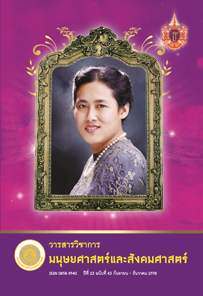Decision Factors for International Exchange Cultural Program (IECP):Case Study of Burapha University International College (BUUIC) Students’ Expectation
Main Article Content
Abstract
This research aimed to analyze and examine the attributes of Burapha University International College (BUUIC) students’ expectation in an International Exchange Cultural Program (IECP). There were 400 students by quota samplingfrom BUUIC students who preferred to participate in the International Exchange Cultural Program (IECP). The instrument was a questionnaire that consists of 2 parts; firstly, students’ demographic andsecondly, students’ expectation. The methodology for data analysis wasexploratory factor analysis (EFA) by Principal Component Analysis with Varimaxrotation andas well as K-MeansCluster Analysis. The results of the research showed that there were 6 factors of students’ expectation, that determine theparticipation in an International Exchange Cultural Program,which included 1) facility and hospitalityaffordability, 2) new experience and finance, 3) restaurant and shopping arrangement, 4) information sharing, 5) local guide’s performance, and 6) service management. Moreover, the perceived outcome of students from Cluster Analysis showed 2 interesting groupsthat BUUIC has to concern; 1) service perceived, and 2) products andknowledge perceived.
การวิจัยนี้ มีจุดประสงค์เพื่อศึกษาความคาดหวังของนิสิตวิทยาลัยนานาชาติ มหาวิทยาลัยบูรพาโดยการวิเคราะห์และทดสอบปัจจัยของนิสิตที่ต้องการเข้าร่วมโครงการแลกเปลี่ยนวัฒนธรรมนานาชาติ กลุ่มตัวอย่าง คือ นิสิตวิทยาลัยนานาชาติ มหาวิทยาลัยบูรพา จำนวน 400 คน โดยการเลือกตัวอย่างแบบโควต้า เครื่องมือที่ใช้ในการวิจัย คือ แบบสอบถาม โดยแบ่งออกเป็น 2 ส่วน ได้แก่ ข้อมูลทางประชากรศาสตร์และความคาดหวังของนิสิต สำหรับการวิเคราะห์ใช้วิธีวิเคราะห์องค์ประกอบและหมุนแกนปัจจัยด้วยวิธี varimax rotation ในส่วนการจัดกลุ่มผู้เข้าร่วมใช้การวิเคราะห์กลุ่มด้วยเทคนิคการวิเคราะห์การจัดกลุ่มแบบ K-Means ผลการวิจัยพบว่า มีปัจจัยความคาดหวังที่ส่งผลต่อการเข้าร่วมโครงการของนิสิต จำนวน 6 ปัจจัย ได้แก่ 1) ปัจจัยด้านสิ่งอำนวยความสะดวกและงานบริการ 2) ปัจจัยด้านการแสวงหาประสบการณ์ใหม่และการเงิน 3) ปัจจัยด้านการจัดการร้านอาหารและการซื้อของ 4) ปัจจัยด้าน การให้ข้อมูล 5) ปัจจัยด้านการปฎิบัติตนของมัคคุเทศก์ท้องถิ่น และ 6) ปัจจัยด้านการจัดการทางด้านบริการ นอกจากนี้ การวิเคราะห์การจัดกลุ่มของการรับรู้ของนิสิตในการเข้าร่วมโครงการนี้สามารถจำแนกออกได้เป็น 2 กลุ่ม ได้แก่ 1) กลุ่มที่เน้นการบริการ และ 2) กลุ่มที่เน้นผลิตภัณฑ์และความรู้
Downloads
Article Details
บทความทุกบทความเป็นลิขสิทธิ์ของวารสารวิชาการมนุษยศาสตร์และสังคมศาสตร์ มหาวิทยาลัยบูรพาเท่านั้น


